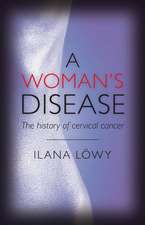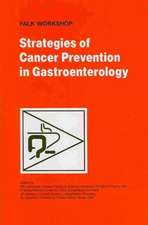Philosophy of Cancer: A Dynamic and Relational View: History, Philosophy and Theory of the Life Sciences, cartea 18
Autor Marta Bertolasoen Limba Engleză Hardback – 5 sep 2016
| Toate formatele și edițiile | Preț | Express |
|---|---|---|
| Paperback (1) | 574.75 lei 38-44 zile | |
| SPRINGER NETHERLANDS – 12 iun 2018 | 574.75 lei 38-44 zile | |
| Hardback (1) | 590.18 lei 38-44 zile | |
| SPRINGER NETHERLANDS – 5 sep 2016 | 590.18 lei 38-44 zile |
Din seria History, Philosophy and Theory of the Life Sciences
- 15%
 Preț: 642.83 lei
Preț: 642.83 lei - 18%
 Preț: 735.84 lei
Preț: 735.84 lei - 15%
 Preț: 644.95 lei
Preț: 644.95 lei - 9%
 Preț: 627.82 lei
Preț: 627.82 lei -
 Preț: 349.63 lei
Preț: 349.63 lei - 18%
 Preț: 1240.76 lei
Preț: 1240.76 lei - 18%
 Preț: 785.55 lei
Preț: 785.55 lei -
 Preț: 398.63 lei
Preț: 398.63 lei - 15%
 Preț: 701.06 lei
Preț: 701.06 lei -
 Preț: 389.11 lei
Preț: 389.11 lei - 15%
 Preț: 651.02 lei
Preț: 651.02 lei -
 Preț: 391.22 lei
Preț: 391.22 lei - 15%
 Preț: 646.43 lei
Preț: 646.43 lei - 15%
 Preț: 644.49 lei
Preț: 644.49 lei - 18%
 Preț: 1120.05 lei
Preț: 1120.05 lei - 15%
 Preț: 583.78 lei
Preț: 583.78 lei - 5%
 Preț: 1103.39 lei
Preț: 1103.39 lei -
 Preț: 438.69 lei
Preț: 438.69 lei - 15%
 Preț: 693.57 lei
Preț: 693.57 lei - 15%
 Preț: 638.57 lei
Preț: 638.57 lei - 5%
 Preț: 906.63 lei
Preț: 906.63 lei - 15%
 Preț: 692.09 lei
Preț: 692.09 lei -
 Preț: 353.99 lei
Preț: 353.99 lei - 18%
 Preț: 949.23 lei
Preț: 949.23 lei - 18%
 Preț: 735.21 lei
Preț: 735.21 lei - 18%
 Preț: 725.75 lei
Preț: 725.75 lei - 18%
 Preț: 792.19 lei
Preț: 792.19 lei -
 Preț: 357.63 lei
Preț: 357.63 lei - 24%
 Preț: 713.96 lei
Preț: 713.96 lei -
 Preț: 354.38 lei
Preț: 354.38 lei
Preț: 590.18 lei
Preț vechi: 776.56 lei
-24% Nou
Puncte Express: 885
Preț estimativ în valută:
112.93€ • 117.92$ • 93.25£
112.93€ • 117.92$ • 93.25£
Carte tipărită la comandă
Livrare economică 11-17 aprilie
Preluare comenzi: 021 569.72.76
Specificații
ISBN-13: 9789402408638
ISBN-10: 9402408630
Pagini: 212
Ilustrații: XV, 190 p. 13 illus. in color.
Dimensiuni: 155 x 235 x 17 mm
Greutate: 0.54 kg
Ediția:1st ed. 2016
Editura: SPRINGER NETHERLANDS
Colecția Springer
Seria History, Philosophy and Theory of the Life Sciences
Locul publicării:Dordrecht, Netherlands
ISBN-10: 9402408630
Pagini: 212
Ilustrații: XV, 190 p. 13 illus. in color.
Dimensiuni: 155 x 235 x 17 mm
Greutate: 0.54 kg
Ediția:1st ed. 2016
Editura: SPRINGER NETHERLANDS
Colecția Springer
Seria History, Philosophy and Theory of the Life Sciences
Locul publicării:Dordrecht, Netherlands
Cuprins
1. Cancer Biology.- 2. The Evolution of Explanatory Models of Cancer.- 3. The Systemic Approach to Cancer: Models and Epistemology.- 4. The Tissue Organization Field Theory and an Anti-Reductionist Campaign.- 5. Towards a Relational Ontology for Cancer.- 6. On Biological Explanations.- 7. Complementary Issues of a Relational View of Biological Determination.
Recenzii
“Bertolaso’s book offers a useful perspective to disentangle the shift in cancer’s research from the short-lived thrill of simplicity, which pervaded it at the early time of its molecularization, to more cautious approaches to real-life complexity.” (Silvia Caianiello, Acta Biotheoretica, Vol. 66, 2018)
Notă biografică
Marta Bertolaso is Assistant Professor for Philosophy of Science at University Campus Bio-Medico of Rome, Italy. After a degree in Biological Sciences and some years in the lab, she developed her academic career in the Philosophy of Life Sciences. Her expertise in philosophy of cancer, scientific practice and philosophy of complex organized systems has allowed her to collaborate with various journals and to publish monographs and papers sometimes in collaboration with established scientists. Supported by Visiting or Scholar Fellowships, she has worked in prestigious international research centres for Philosophy of Science including Pittsburgh (PA, USA), Exeter (UK), Paris (France) and the European Oncology Institute (IEO). She promotes and coordinates an international and interdisciplinary research network, participates in funded national and international research and educational projects. Lecturer for philosophy and epistemology in scientific practice in different courses at Campus Bio-Medico, she has been giving seminars and talks in different Universities and countries.
Textul de pe ultima copertă
Since the 1970s, the origin of cancer is being explored from the point of view of the Somatic Mutation Theory (SMT), focusing on genetic mutations and clonal expansion of somatic cells. As cancer research expanded in several directions, the dominant focus on cells remained steady, but the classes of genes and the kinds of extra-genetic factors that were shown to have causal relevance in the onset of cancer multiplied. The wild heterogeneity of cancer-related mutations and phenotypes, along with the increasing complication of models, led to an oscillation between the hectic search of ‘the’ few key factors that cause cancer and the discouragement in face of a seeming ‘endless complexity’. To tame this complexity, cancer research started to avail itself of the tools that were being developed by Systems Biology. At the same time, anti-reductionist voices began claiming that cancer research was stuck in a sterile research paradigm. This alternative discourse even gave birth to an alternative theory: the Tissue Organization Field Theory (TOFT). A deeper philosophical analysis shows the serious limits of both reductionist and anti-reductionist positions and of their polarization. This book demonstrates that a radical philosophical reflection is necessary to drive cancer research out of its impasses. At the very least, this will be a reflection on the assumptions of different kinds of cancer research, on the implications of what cancer research has been discovering over 40 years and more, on a view of scientific practice that is most able to make sense of the cognitive and social conflicts that are seen in the scientific community (and in its results), and, finally, on the nature of living entities with which we entertain this fascinating epistemological dance that we call scientific research. The proposed Dynamic and Relational View of carcinogenesis is a starting point in all these directions.
Caracteristici
First book describing the relevance of cancer research for epistemology Contains graphic representation of the historical evolution of models of carcinogenesis that enables the reader to follow the overall argument Overview of the two key theories about carcinogenesis that confront each other in the literature ?








